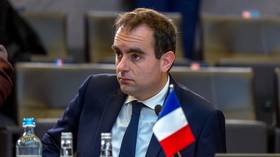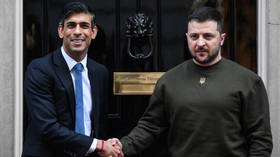Mercenaries and neo-Nazis: Why French citizens keep dying senseless deaths for Ukraine
Paris says it has no fighters on Kiev’s side – after all, plausible deniability is the whole point of guns for hire
It used to be a point of pride for Western nations that their citizens were so eager to go play Rambo in Ukraine with dreams of ‘smoking’ Russians. Or at least they didn’t seem too keen on stopping them. Now, they don’t even want to admit they exist.
Such patriots, fighting for nothing less than Western freedom! It all seemed like fun and games until the missiles started flying and they realized (too late, in some cases) that the Russian army isn’t just a non-playable entity in a video game.
Just this week, Russia’s Defence Ministry said it had hit a nest of 60 foreign fighters in Kharkov — most of whom, it claims, were French. If true – although the French government denies that’s the case – it would raise a lot of questions, like why are French nationals fighting Russia in Ukraine? Who are these people, exactly? Why the Gallic shrug from Paris over their presence in an armed conflict zone when the ubiquity of Western intelligence in Ukraine suggests that France should be well aware of what’s happening?
The French government has already proven that it has a really good idea of what French citizens are doing in Ukraine. Last year, French domestic intelligence has said that of the 400 French fighters in Ukraine, about 30 are already known as neo-Nazis. Russia has even said that it’s investigating alleged crimes committed by some of these French mercenaries. French National Assemblyman Frederic Mathieu of the left-wing France Insoumise party alerted the French interior minister last year to the threat of French citizens who head over to Ukraine to hang out with Ukrainian fighters, thinking that it’s a neo-Nazi Disneyland, and then come back as a terrorist risk themselves. The head of the French domestic intelligence service (the DGSI) suggested the same in the French press in July 2023, citing the mercenaries’ “neo-Nazi inspiration.”
The specific case of two French guys in their 20s was brought up as an example. They reportedly got off a bus in Paris, from Lviv, in April 2023, toting banned assault rifle magazines and optical sights, and were subsequently sentenced to prison almost on the spot. Both had been tracked by French intelligence, again proving that Paris is hardly blindsided by the reality of who’s over there fighting for “democracy” in Ukraine.
One of the French mercenaries had previously been featured in reporting on neo-Nazis in the French army. He was in the alpine hunter division, so no doubt could teach a thing or two to the “Snow ISIS” neo-Nazis trained and equipped by NATO allies against Russia in the run-up to the conflict. He reportedly also has a tattoo of the SS loyalty pledge to Adolf Hitler, and is said to have written on Facebook in 2018 that migrants should get a “good bullet in the back of the head.”
The previous year, Hungary nabbed another French neo-Nazi, previously accused of murdering an Argentinian rugby player, claiming that he was en route to fight in Ukraine.
So at least one French elected official expressed worry last year over the potential proliferation of extremism upon the return of these fighters from Ukraine, and about the influence on them of Azov battalion neo-Nazis, even as these same “heroes” are invited and praised as guest speakers at the prestigious Stanford University, and generally glorified as defenders of Western democracy and freedom.
The Western establishment politicians don’t generally seem keen to discuss some of the inconvenient details that have come out about their neo-Nazi protégés. Nor do they seem interested in explaining what some of their citizens, including former military, have been doing hanging out with them in Ukraine. Not exactly a convenient exploratory discussion to be having when the French government has been trying to dismiss Russian President Vladimir Putin’s “denazification” argument as justification for military intervention in Ukraine.
The incident also risks raising questions over the role that French private military contractors may be playing in Ukraine. While some French citizens might be drawn to Ukraine for the kicks and giggles and fascist camaraderie, others may be seduced by financial opportunity. And that’s a conversation that Paris probably doesn’t want to have, particularly given that French law dating back to 2003 prohibits mercenary activity.
But even the European Commission has given Paris side-eye, saying in response to a parliamentary question back in 2012 that French military and security companies “have their head offices or registered offices in the European Union — in particular in countries such as the United Kingdom and France — and services are outsourced on the EU market by public and private organisations from both within and outside the European Union.”
Anyone who has watched any of the Mission Impossible movies starring Tom Cruise knows that the whole idea of mercenaries is that they can be fired like a missile, and then forgotten about. Cruise’s character, Ethan Hunt, is told at the beginning of every movie that if his team fails its covert mission, they’d be disavowed. Similarly, the whole idea of hiring mercs is to maximize the fog of war while creating a footprint for a state actor who isn’t supposed to be there. The last thing that any government is going to do is lay claim to them in the wake of a screwup. That’s why they’re paid the big bucks – to take the big risk, and then the big blame when things go wrong.
Some talking heads in the French press have chalked down Moscow’s French mercenary strike claim to little more than manufactured “media blowback” against French President Emmanuel Macron in the wake of his announcement earlier this week that Paris would provide 40 long-range Scalp missiles for Kiev.
“Another clumsy Russian manipulation,” the French Foreign Ministry called it, adding that “France has no ‘mercenaries’ either in Ukraine or anywhere else, unlike some people.” But the Russian foreign Ministry was already saying back in July 2023 that since June 2022, French PMCs “have been bringing onboard volunteers to participate in hostilities on Kiev’s side…French nationals taking part in the hostilities in Ukraine often get there via foreign PMCs or the Ukrainian International Legion.”
There’s one way to settle the debate over whom exactly perished in the incident once and for all. Moscow should just call Paris’ bluff and release their identities. Let’s call it an open source global collaboration in the interests of transparency.
The statements, views and opinions expressed in this column are solely those of the author and do not necessarily represent those of RT.







Comments are closed.